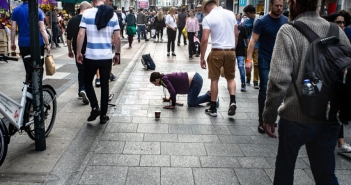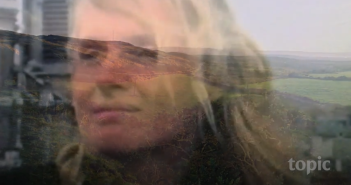Irene H.
Going into your house, I sat in the conservatory waiting for the door to open. Waiting for your familiar rasping voice to call, “Mann! Herzenskind, komm rein.” I remained there still in the leather chair, trying to pluck up the courage to open the door and be met with emptiness. You’d snuck out one night three weeks earlier.
In almost a century of life, history marked Irene Hauser (née Leitgeber) and she, in turn, was determined to leave her mark. Born in Berlin’s Wedding district in 1924, her life was shaped by passages in history books. As a twelve year-old girl she sat in the stands watching Leni Riefenstahl film the 1936 Olympics, so awe-struck by the cameras that she almost forgot to watch any of the tournament.
She left school without graduating and when she told her parents at the end of the war that she wanted to go to university they thought she had lost her mind. It wasn’t her first choice. She had wanted to become a fashion designer but with barely enough food around to feed the population, whatever about fabric, that seemed like an even more fanciful idea. So Irene became the first person to go to university in her family and enrolled in physics at East Berlin’s Humboldt University, where she accounted for one half of the female student population on her course.
The city had been bombed into the ground and few possessed the creativity to imagine how this heap of rubble could ever resemble a functioning city again. Irene’s lectures were held inside some of the brick skeletons that remained scattered through the city, and during the icy winter months she sat in the auditorium wrapped in an over-sized fur coat.
In the 1980’s she retired as a professor in physics. Much must have happened between those two moments and sometimes she spoke about her work but it was the stories of what seemed like fantastical adventures that burned themselves into the mind of her youngest granddaughter. She told of her trip to Hanoi during a ceasefire in the Vietnam War. Her delegation was sent to provide expertise to Vietnamese scientists in the war effort, and Irene spent much of her time there trying to avoid the local food. In the 1960s she and her husband, also a physicist, worked on a secret research programme near Dresden to develop nuclear power.
The lust for life you possessed made everything seem possible and any fragility a bewildering concept. As we all sat in the chapel, your funeral seemed such a ludicrous event.
Although Irene knew how to bring her experiences to life in the stories she told, there was much silence about the suffering she witnessed and endured. Like many of her contemporaries, it was her actions that provided clues about the war that marked her.
No scrap of food was ever thrown away. Instead she tried to redistribute what she didn’t want to eat. Once she attempted to cajole her granddaughter into packing a half-eaten sausage for her trip back to London.
When she did speak about it, it was so matter of fact that there was little room for emotions. Anecdotes like the dead body lying in the hallway of the apartment block, which stopped her home being looted or the ridiculousness of her trying to salvage a carpet from her aunt’s burning home after an air raid seemed like abstractions. Even then, recounting herself walking through one of Berlin’s wide avenues lined by blazing buildings drew a harrowing image.
Irene was just twenty then. She grabbed life whichever way she could. So when she met the funny and clever Oskar at a laboratory she worked in, she didn’t see his limp. When an overseer, whose only function was to report to the SA (Sturmabteilung), threatened her with concentration camp if she carried on seeing the Halbjuden, meeting Oskar in secret seemed the only plausible solution to her dilemma.
Oskar didn’t want to let her marry him — him! A cripple. But Irene had made up her mind. And so it went. The two celebrated the defeat of Nazi Germany with a wedding and a rhubarb pie. Four years later, Irene gave birth to her only surviving child while Oskar was imprisoned on trumped up smuggling charges and cultivating his life-long aversion to Skat, a card game he played from morning till night with other inmates to pass the long days. His imprisonment had mobilised a student movement and although newspaper clippings of the protests and petitions for his release had been kept in a folder, Irene gave them to an archive soon after his death. Forward was the only direction she knew.
You always had a solution to everything and knew how to cover your tracks when you didn’t. Your quirky pride left no room for any admission of defeat. After you gave up smoking, you developed an affinity for checking on the washing behind the shed after each meal. Even your own son had no idea that you couldn’t cook until granddad died.
Much was left untold. Secretly we pieced some of your story together not to feel so inadequate in your shadow. To get to know the fallible human. Next to you our failures sometimes stung unbearably.
Perhaps a growing awareness of her silence prompted Irene to write a small booklet about her life in her last years. No one was to read it until she was gone. There was little sense that writing it gave her much joy. Rather it was a task that had to be completed, and like every task in life, complete it she did.
It recounts her childhood experiences in the Third Reich: pushing her parents to allow her to join the Bund Deutscher Mädchen (the equivalent to the Hitler Youth for girls) against their will; the turmoil of the post-war years, and the division of Berlin; her many professional achievements, and some reflections on the political life of the time in which she was inevitably involved. Maybe some modesty stopped her from indulging personal impressions and feelings in her booklet, but an impatience for anything that lay in the past certainly did.
In our last phone call you told me to never grow this old. The thought of being a burden to anyone was a greater weight on you than you could bear. ‘But grandma, we’re all so happy you got this old.’ Although I didn’t know it then with that I let you go. That day I stopped tearing and pulling at you. Life would be ok. Your death was befitting of your life. Fast and impatient.
Photo Caption: A photo of Irene, perhaps strict and stern to any stranger. But for those who knew her those lips hold back a smile and those eyes are filled with a lively curiosity that lasted as long as she did. By Franziska Hauser
We rely on contributions to keep Cassandra Voices going.




